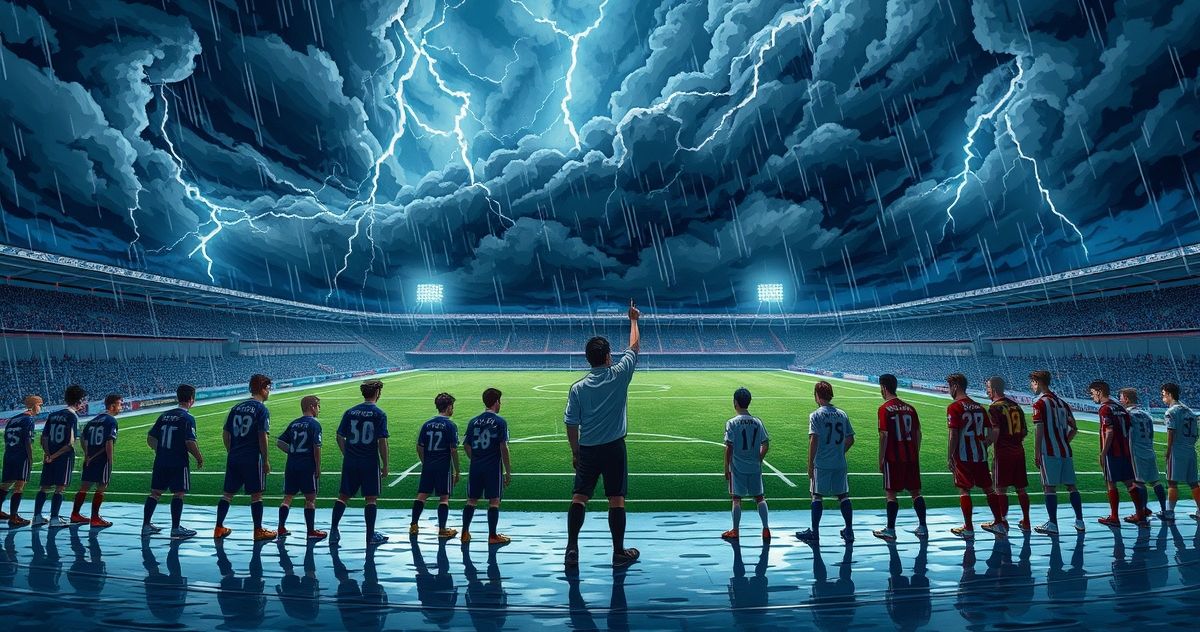Unprecedented Game Duration Raises Alarms
With the 2026 North American World Cup just over a year away, weather has emerged as the tournament's biggest variable. The ongoing Club World Cup has repeatedly experienced game interruptions due to lightning and extreme heat, raising serious concerns about next year's flagship tournament. The Chelsea vs. Benfica Round of 16 match, which lasted an unprecedented 4 hours and 38 minutes, has sent shockwaves through the soccer community.

The Chelsea-Benfica clash created an extraordinary record in soccer history. With Chelsea leading 1-0 through Reece James' free kick in the 41st minute of the second half, the referee suspended play due to lightning forecasts. The game remained halted for approximately two hours before resuming, eventually requiring extra time and creating a total duration of 4 hours and 38 minutes.
During the suspension, lightning strikes were captured live on broadcast television, while players remained in locker rooms for extended periods. Despite Chelsea's eventual 4-1 victory, manager Enzo Maresca expressed frustration with the bizarre game management, stating "This is not football" despite the positive result.
Unique Challenges of American Summer Climate
The impact of America's summer climate on soccer matches has proven more severe than anticipated. The harsh summer weather across the North American continent combines scorching temperatures reaching 40°C (104°F) with sudden lightning storms and torrential downpours.
FIFA safety regulations mandate 30-minute game suspensions when lightning is forecast within 8 miles (approximately 13 kilometers). These protocols have resulted in frequent game flow interruptions, negatively affecting player conditioning and match rhythm.
Kim Pan-gon, who led Ulsan HD in the Club World Cup, expressed concerns about these weather variables: "Lightning is a major factor. When games are suspended due to lightning, players can lose their concentration. The national team needs to consider how to manage these interruption periods."
Warning Signs for 2026 World Cup
The Club World Cup serves as a rehearsal for next year's 2026 North American World Cup, making the current climate issues particularly alarming. The World Cup will attract significantly more spectators and media attention than the Club World Cup, meaning repeated game suspensions could deliver devastating blows to tournament operations.
FIFA's policy of maintaining daytime schedules to boost European TV ratings has come under criticism. North American summer afternoons represent peak heat periods, potentially seriously impacting player safety and performance levels.
The decision to prioritize European broadcasting schedules over local climate conditions reflects broader challenges in globalizing major sporting events while ensuring participant safety and game quality.
Player Safety and Performance Concerns
Hong Myung-bo, South Korea's national team manager, recently visited Club World Cup venues and expressed weather-related concerns. Continuous lightning-related safety protocol applications have frequently disrupted game flow, creating conditioning challenges for players.
Soccer commentator Kim Young-gwon analyzed: "We've never worried about weather during World Cups before. Even the Qatar tournament three years ago was moved to winter to avoid desert heat, but the North American World Cup returns to summer, creating new variables."
Need for Alternative Solutions
The soccer community increasingly demands urgent preparation for climate variables ahead of the 2026 World Cup. Experts suggest comprehensive reviews of game scheduling, safety regulations, and player protection measures from multiple angles.
Some propose creating new game operation manuals for extreme weather situations. The challenge lies in finding solutions that prioritize player safety while maintaining game fairness and continuity.
Impact on Spectator Attendance
Weather issues have also negatively affected crowd attendance. Following repeated game delays due to lightning and storms during the Club World Cup, FIFA has distributed free tickets to boost attendance numbers. However, unpredictable weather patterns have deterred spectator stadium visits.
If these problems persist during the World Cup, they could damage both tournament excitement and FIFA's credibility, demanding fundamental solutions.
The current situation serves as a critical test case for how major international sporting events can adapt to increasingly unpredictable climate conditions while maintaining competitive integrity and spectator engagement.
Original: https://trendy.storydot.kr/sports/world-cup-lightning-variables-climate-challenges


0 Comments